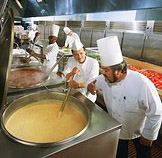| |
Food Combining - Rules & Principles
|
|

Virtually all of us have had the experience where "something" we ate did not agree with us. We know that certain combinations of food do not suit us. Let's give recognition to this fact, enjoy food more and increase the performance of our bodies.
The rules are easy to follow:
Eating meat, fish and eggs is concentrated protein. To digest these your stomach must produce vast amounts of acid and digesting enzymes. Therefore:
- Don't drink liquids with the meal;
- Don't eat any sugar;
- Eat plenty of vegetables and vegetable protein with the meat protein;
- Allow 2-3 hours for digestion and your next food/drink intake.
Potatoes, turnips, pumpkin, leaf vegetables, pasta, nuts, seeds, sprouts and all breads are COMPLEX carbohydrates. Digestion of these foods produce an alkaline solution in the stomach. They are very easy to digest. Therefore:
- Limit your liquid intake at the meal;
- Don't eat any sugar;
- Allow 1-2 hours for digestion and your next food/drink intake.
Instant energy is best found in all fruit. They contain the best source of SUGAR our body needs from time to time. Digestion is quick for our bodies can easily produce the enzymes and hormones required. The stomach solution becomes alkaline. Therefore:
- Eat as a snack between meals;
- Limit your intake of drink;
- Don't eat candy, chocolate or sugar products at the same time;
- Allow 30 minutes for digestion before the next meal/food/drink intake.
Having listed a few simple rules, the principles behind the rules follow:
1. The acid/alkaline balance of the blood is directly effected by what you eat. As shown in Dr. Shishlov's Methods, keeping our blood slightly alkaline is the secret of prolonged health and a lifestyle of fun and energy. Try to get 55-70 % of your energy needs from COMPLEX CARBOHYDRATES every day because stress is a key factor that acidizes our blood.
2. Many foods are part protein and part carbohydrate. Enjoy them as they are, it is not practical to try to separate them. It is the combining of concentrated protein with concentrated starch that is of limited benefit, e.g. is a beef steak and baked potato.
3. Acid is formed in our digestive system from the phosphorus, sulphur, nitrogen and chlorine found in animal products, fish, eggs, etc.
Alkaline is formed in our digestive system from the calcium, potassium, magnesium and sodium found in vegetables, pastas, pulses and nearly all fresh fruit. (Fresh whole and skimmed milk are mildly alkaline). Our body needs are satisfied by eating vast quantities of these foods.
4. Our bodies have no need for the fast-releasing energy that comes from processed, sugar-filled, food. In fact the body simply is not adapted to deal with a flood of sugar, that causes blood sugar to sky rocket. When this happens all sorts of enzymes and hormones are released in an emergency action to restore the balance. At the same time the sugar becomes feed to undesirable micro-organisms in the digestive tract, such as candida yeast.
Ripe fruit is easily digested and absorbed, in balance, in the blood. Almost all fruit is readily fermented, rapidly in the warm acid of our stomach juices. This is why it should be eaten on its own. The exception is bananas, coconuts and apples. They do not ferment. So bananas in porridge, or with grain cereal, is an acceptable meal.
These Principles were first expressed in the 1930's by Dr.Hay. His theory was to eat plenty of alkaline forming foods, eat fruit on its own, avoid refined and heavily processed foods, and do not mix protein rich with carbohydrate rich foods. In the last 65 years we have found more and more evidence to support his theory.
Food combinations - Do's and Don'ts:
|





